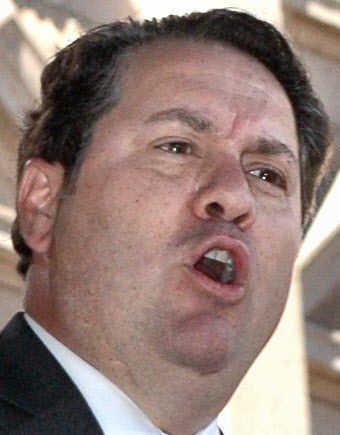├█Ķųų▒▓źŌĆÖs top prosecutor intends to pursue his lawsuits challenging benefits for ŌĆ£dreamersŌĆØ even as the president has given Congress six months to fix the program or start phasing it out.
Mark Brnovich told Capitol Media Services that what the Trump administration announced Tuesday could make the entire issue moot.
On the one hand, he said, if Congress passes a legal replacement for Deferred Action for Childhood Arrivals, then the nearly 28,000 in ├█Ķųų▒▓ź who have been accepted into the program get the legal status they need to have a state-issued driverŌĆÖs license and get in-state tuition at colleges and universities.
Conversely, Brnovich said if Congress falters, then DACA begins to self-destruct in March ŌĆö as does any legal basis for those in the program to claim they are entitled to be here and get certain benefits.
People are also reading…
But in the interim, he said, the cases continue.
ŌĆ£My job as attorney general is to enforce the law as it is, not as I want it to be,ŌĆØ he said.
ŌĆ£I hope Congress comes up with a solution to address the DACA issue,ŌĆØ Brnovich continued. ŌĆ£But until we do, we have to proceed accordingly as a state.ŌĆØ
ThatŌĆÖs also the position of former state Senate President Russell Pearce.
He told Capitol Media Services on Tuesday that he intends to sue members of the ├█Ķųų▒▓ź Board of Regents personally if Brnovich does not bring a new lawsuit against them by Saturday. He said whatever Congress does about ŌĆ£dreamersŌĆØ does not excuse the fact that board members allowed DACA recipients to pay less in tuition than he says a 2006 voter-approved law allows.
Among the cases pending is BrnovichŌĆÖs request that the U.S. Supreme Court allow ├█Ķųų▒▓ź to rescind the driverŌĆÖs licenses that a federal appeals court ordered the state to provide to DACA recipients.
Brnovich told the justices that the 2012 decision by former President Barack Obama to create DACA is not federal law but merely a directive to allow those who arrived in this country illegally as children to remain and be able to work. What that means, he said, is DACA recipients have no legal immigration status.
What makes that important, he said, is a 1996 ├█Ķųų▒▓ź law that says licenses are available only to those whose presence in this country is ŌĆ£authorized by federal law.ŌĆØ
That argument failed to convince federal appellate judges who said ├█Ķųų▒▓ź cannot decide for itself who is legally entitled to be in the country.
Jennifer Chang Newell, an attorney with the American Civil Liberties Union, said the best thing for the Supreme Court to do would be to reject BrnovichŌĆÖs request for review.
She said no court has ever concluded that DACA is illegal.
ŌĆ£But even if it was, the announcement today about the administrationŌĆÖs decision to end the program only strengthens the conclusion that the case is not worthy of the Supreme CourtŌĆÖs attention,ŌĆØ Newell said.
ŌĆ£The program that ├█Ķųų▒▓ź is complaining about is coming to an end anyway, regardless of anything the Supreme Court is going to say.ŌĆØ
There is a parallel lawsuit brought by others who are not here legally but have been allowed by the federal government to stay, like victims of domestic abuse, whom ├█Ķųų▒▓ź also denied licenses in a bid to show the state is treating all deferred-action recipients equally. The implications of the future of DACA are less clear for those individuals.
The other big issue is whether DACA recipients are entitled to residential status so they can attend public colleges by paying in-state tuition.
At this point, Brnovich has the upper hand, legally speaking.
Earlier this year, a three-judge panel of the state Court of Appeals ruled unanimously that Proposition 300, approved by voters in 2006, clearly says that in-state tuition is reserved only for those with ŌĆ£lawful immigration status.ŌĆØ Judge Kenton Jones said the decisions by the Obama administration to let those who arrived illegally in this country as children to remain and work ŌĆ£do not translate into the recipientsŌĆÖ eligibility for in-state tuition or other state and local public benefits.ŌĆØ
Mary OŌĆÖGrady, attorney for the Maricopa community colleges, the defendant in the lawsuit, is arguing to the ├█Ķųų▒▓ź Supreme Court that the federal government considers DACA recipients to be ŌĆ£lawfully present,ŌĆØ even if they have no legal immigration status. She said that means the college Governing Board acted legally in allowing them to pay reduced tuition.
And college spokesman Matthew Hasson said Tuesday that the appeal will continue even after the presidentŌĆÖs announcement.
But what the justices decide had broader effect.
Following a trial court decision upholding the Maricopa policy, the state Board of Regents followed suit and now charge DACA recipients in-state tuition. Several other community college systems have done the same.
Brnovich said he intends to ask the justices to uphold the appellate ruling ŌĆö even if DACA either becomes legal or goes away in March. And itŌĆÖs not just to affirm the decision about the Maricopa colleges, but to bring the university system into compliance.
ŌĆ£At the end of the day, we have an obligation to enforce the law as it is,ŌĆØ he said.
ŌĆ£Proposition 300 was passed by nearly 70 percent of the ├█Ķųų▒▓ź voters,ŌĆØ Brnovich said. ŌĆ£The reality is that the Board of Regents are frankly thumbing their noses at ├█Ķųų▒▓ź voters.ŌĆØ
Board Chairman Bill Ridenour said he doesnŌĆÖt see it that way. And Ridenour said it is the position of most board members to keep the in-state tuition in place unless and until the ├█Ķųų▒▓ź Supreme Court rules otherwise.
But Ridenour, who is an attorney, said he doesnŌĆÖt think the last word will end up with the stateŌĆÖs high court.
ŌĆ£I would suspect the (Supreme Court, when they take this up, will not be in any hurry to make a ruling until such time as it is determined, at least by Congress, what the DACA studentsŌĆÖ status is going to be,ŌĆØ he said.
With no court ruling likely soon ŌĆö and Congress likely to wait until next year ŌĆö Ridenour said the tuition policy will remain into the spring semester.
In the interim, though, Pearce said he will pursue his own litigation to make individual regents personally financially liable for voting to allow DACA recipients to pay in-state tuition, even in the face of the Court of Appeals ruling.
The Board of Regents ŌĆ£is damaging the nation and destroying the rule of law,ŌĆØ said Pearce, who is represented by Judicial Watch. ŌĆ£And I will not stand by and allow that to go on.ŌĆØ
Pearce is using a section of law that says if the attorney general does not act within 60 days of a request to enforce certain state laws, an individual may sue to recover financial damages. That deadline is Saturday.
Brnovich questioned why anyone would sue now, pointing out the entire issue could be made moot by Congress by the time that lawsuit ever gets into court. Anyway, the attorney general said he wonŌĆÖt be forced into opening a new legal front against the universities simply because Pearce and Judicial Watch are pushing the issue.
ŌĆ£What I donŌĆÖt want this office doing is trying to score cheap political points,ŌĆØ he said. ŌĆ£We donŌĆÖt kowtow to anyone.ŌĆØ
On Twitter: @azcapmedia


































